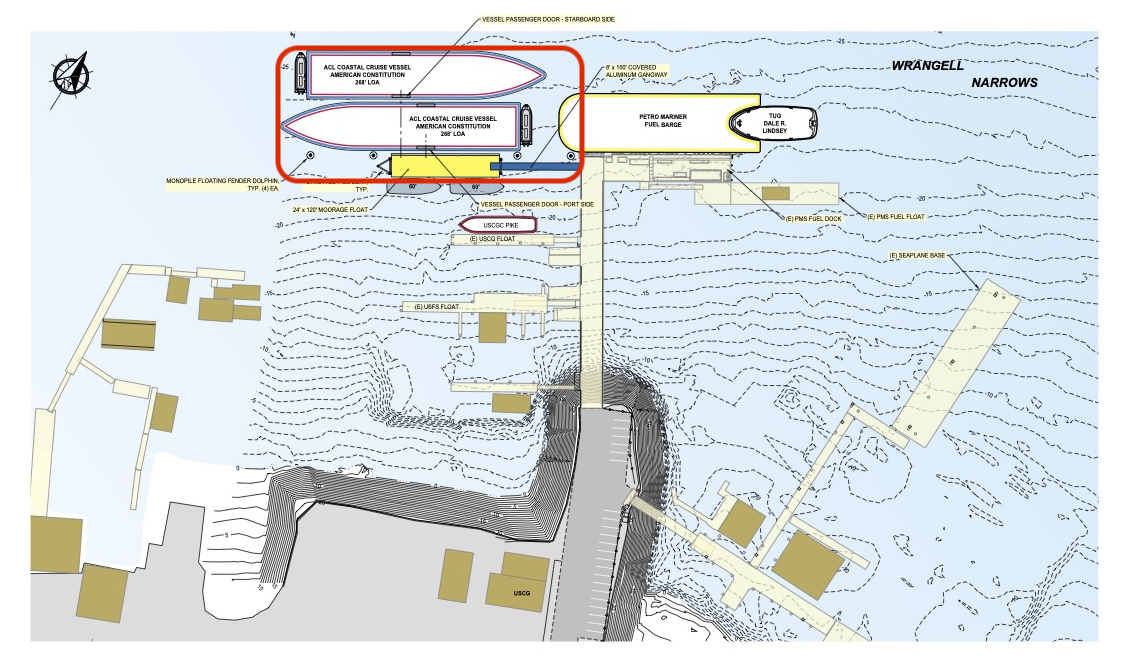
American Cruise Lines (ACL) wants to build a new floating dock extension in Petersburg. The local harbor department and the cruise company have been in talks about the potential project since last year. And on May 5, the Petersburg Borough Assembly considered the company’s application as a first step in the vetting process.
A representative from the cruise company visited Petersburg in January and told the community during a town hall that the dock would belong to the borough to control. And while a long-term partnership with the borough remains a priority, ACL has modified its plan, citing “funding concerns.”
But those funding concerns come on behalf of the borough.
“I think it came down to just recognizing the fact that we didn’t really have a good game plan financially,” Harbormaster Glo Wollen said during the discussion. “They want to come tie up starting in 2027. And it’s just, it’s been months of this … I think after our meeting [last month], they could recognize that it just was too big of a jump for the borough to come up with all the funds needed to get this across the finish line.”
The company has shifted its application from the previous public-private partnership to what it calls a more “efficient path forward,” leasing the tidelands from the borough and funding the new dock independently.
ACL proposes that the company build the new dock and lease it from the Petersburg Borough for 50 years, paying standard fees and taxes. ACL would manage the dock, but the borough could take over in the off-season and share in the revenue if it covers maintenance. And “in the spirit of partnership and sustainable tourism,” the dock would only be used for small cruise ships with fewer than 250 passengers.
American Cruise Lines has doubled their stops in Petersburg for this year’s cruise ship season, bringing a second ship to the rotation. Both ships, the American Constellation and American Constitution, are essentially identical — nearly 270 feet with room for up to 170 passengers.
However, because of the limited space in Petersburg’s harbors, department staff will have to evacuate users from C float, which houses larger yachts and tenders, at least a dozen times this summer. The harbormaster has said she hopes the situation is temporary, and that the proposed dock extension could create space to use for future seasons without displacing the local fleet.
Assembly members unanimously agreed to allow ACL’s lease application to proceed. Next, it’ll go to the planning commission and harbor board for consideration before returning to the assembly for further deliberation and public input.
In other harbor-related business: marine industrial overlay zone finally approved by assembly
A new zoning overlay was officially passed by the assembly on Monday. The long-anticipated zoning law creates a dedicated marine industrial overlay (MIO) zone.
Property zoning laws regulate how an area is used. According to the borough, zone overlays are “special zoning subdistricts” that are placed over an area’s existing zoning in order to change how that portion of the space is used.
Putting that MIO zoning into place on the borough’s tidelands helps make sure marine property is used for marine purposes by enforcing certain restrictions.
The new potential zoning applies to tideland properties between South Harbor and the ferry terminal, as well as at the Scow Bay turnaround.
Harbor Department staff and members of the harbor advisory board worked to develop this proposed zoning overlay for over a year, ever since the borough sold some of its leased tideland properties on Dock Street for the first time to local buyers Wikan Enterprises in 2023 and Island Refrigeration in 2024. The landmark sales sparked conversation and concern about preserving the Petersburg Borough’s waterfront for maritime uses.
The only comment made during the final discussion came from Assembly Member Jeigh Stanton Gregor.
“I just wanted to thank all the staff that were part of putting this together,” he said. “I’m aware that it took a lot of work trying to get this dialed-in at the assembly’s request, so thank you.”
All seven borough assembly members voted in support of the new MIO zoning law for the third and final time on May 5, 2025.











